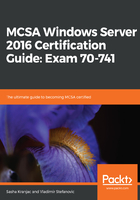
上QQ阅读APP看书,第一时间看更新
Autoconfiguration address states
There are three possible autoconfiguration address states, as follows:
- If an IPv6 node has an address autoconfiguration state that is invalid, then it can no longer receive or send unicast traffic. When an address lifetime expires, it enters the invalid state.
- If an IPv6 node has an address autoconfiguration state that is valid, then it means that it can send and receive unicast traffic. The Router Advertisement message determines the period that an address can exist in the valid state. The valid state itself can be preferred or deprecated. The address state is always equal to or greater than the preferred lifetime.
- If a node's address has been verified and it is unique, then the address enters the valid preferred state. A node can communicate on the network and can send and receive packets for the period of validity determined by the Router Advertisement message, that is, the time an address remains in the preferred and tentative states.
- If a node has a valid but deprecated address, it can still communicate and use the deprecated address, but this address is discouraged for new communications.